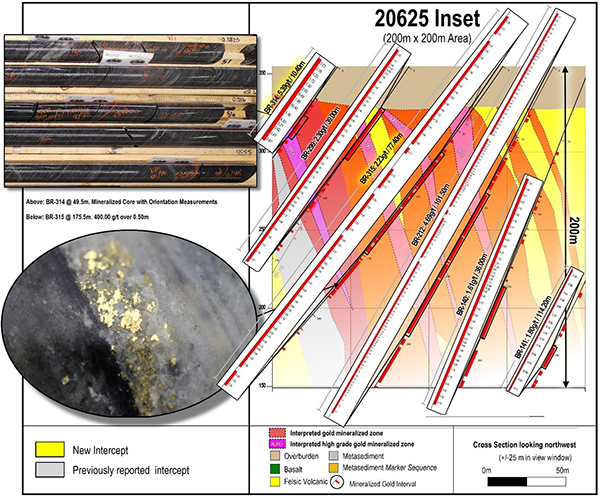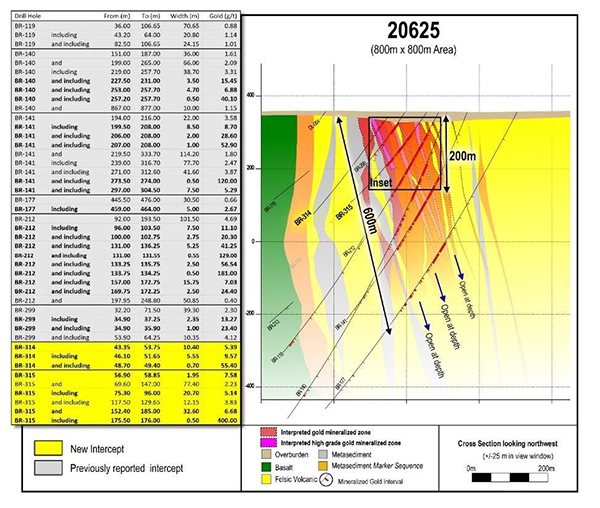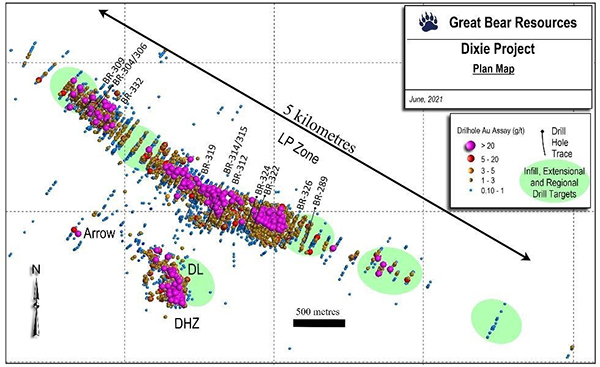Great Bear Provides Assays Across Width of LP Fault Zone, Drills Separate Intervals of 400.00 g/t Gold Over 0.50 m and 2.23 g/t Gold Over 77.40 m in Same Hole
VANCOUVER, BC, June 21, 2021 /CNW/ - Great Bear Resources Ltd. (the "Company" or "Great Bear"), (TSXV: GBR) (OTCQX: GTBAF) today reported results from its ongoing fully funded $45 million 2021 exploration program at its 100% owned flagship Dixie Project in the Red Lake district of Ontario.
Chris Taylor, President and CEO of Great Bear said, "We are now only months away from completing more than fifty 40 – 50 metre spaced drill sections along
4.2 kilometres of the LP Fault zone. These will be required for maiden mineral resource estimation modelling of the near-surface (0 – 400 metre depth), central area of the zone. In this release we provide example cross section 20625, which intersects both high-grade and bulk tonnage gold over an approximate width of 200 metres, as shown on Figure 1. We also provide a table of all individual sample assay results to our web site from every drill hole traversing the upper 200 metres from surface on this section. Additional representative sections will be provided as drilling progresses."
Example Cross Section 20625
New drill hole BR-315 was completed within a 100 metre previously undrilled gap in section 20625 and successfully intersected the three high-grade domains BR7, AURO20 and BR1 which were described in news releases on May 19 and June 3, 2021. It also intersected a fourth recently defined high-grade gold domain, BR4, southwest of the other high-grade domains. BR-315 also intersected bulk tonnage style gold mineralization between the high-grade domains.
Highlights of results include:
- High-grade intercepts include 400.00 g/t gold over 0.50 metres from 175.50 to 176.00 metres downhole. The interval is within newly defined high-grade domain BR4.
- Bulk-tonnage gold intercepts include 2.23 g/t gold over 77.40 metres from 69.60 to 147.00 metres downhole.
- This included 5.14 g/t gold over 20.70 metres from 75.30 to 96.00 metres downhole as the drill hole traversed high-grade domain AURO20, and 3.83 g/t over 12.15 metres from 117.50 to 129.65 metres downhole as the drill hole traversed domain BR7.
- BR-315 was collared within high-grade domain BR1, as shown on Figure 1. It intersected 7.58 g/t gold over 1.95 metres from 56.90 to 58.85 metres downhole corresponding to the up-dip projection of domain BR1 on this drill section.
On the same section, new drill hole BR-314 was collared near the southwest edge of the LP Fault zone. The hole successfully extended high-grade domain BR7 to the near-surface. Results include:
- 55.40 g/t gold over 0.70 metres from 48.70 – 49.40 metres downhole, within a broader interval of 5.39 g/t gold over 10.40 metres from 43.35 to 53.75 metres downhole.
Figure 1: Example cross section 20625 showing all individual assays from reported highlighted intervals with labelled high-grade domains in the near-surface, 200 m x 200 m area of the LP Fault zone. Gold image is of a select interval and does not represent all gold mineralization on the property. (CNW Group/Great Bear Resources Ltd.)
A new table of all individual sample assays within the main gold-hosting felsic volcanic rocks in drill holes BR-140, 141, 212, 299, 314 and 315 are provided on the Company's web site at https://greatbearresources.ca/projects/overview/dixie-project-data/. These holes collectively define the mineralized zone over a width of approximately 200 metres, and from surface to approximately 200 metres vertical depth at this location.
Bulk Tonnage Gold Drilling
11 of the 13 drill holes in this release tested the bulk-tonnage style "halo" adjacent to the high-grade domains along more than 2.5 kilometres of strike length. Drilling intersected gold mineralization from bedrock surface to 500 metres vertical depth.
Results from the bulk tonnage style gold mineralization are presented separately from the high-grade domains, and include:
- Drill hole BR-309 intersected 80.90 metres of bulk-tonnage style gold mineralization over 117 metres of core length between approximately 85 metres and 180 metres vertical depth. Intervals include:
- 0.85 g/t gold over 23.00 metres from 91.10 to 114.10 metres downhole.
- 0.50 g/t gold over 31.00 metres from 142.00 to 173.00 metres downhole.
- 0.57 g/t gold over 26.90 metres from 193.00 to 219.90 metres downhole.
- Drill hole BR-332 intersected 1.02 g/t gold over 52.65 metres from 176.25 to 228.90 metres downhole. The interval extends from approximately 150 to 200 metres vertical depth.
- Drill hole BR-306 intersected 1.08 g/t gold over 106.70 metres from 397.30 to 504.00 metres downhole. The interval extends from approximately 340 to 430 metres vertical depth.
- Drill hole BR-304 intersected 0.73 g/t gold over 74.35 metres from 495.15 to 569.50 metres downhole in drill hole BR-304. This interval extends from approximately 430 to 500 metres vertical depth.
Results demonstrate the gold mineralized zone remains open to extension in all tested locations. The deepest drilling to date has been to approximately 800 metres vertical depth (March 29, 2021).
New Drill Plans
The Company has now released results from 331 LP Fault drill holes. An additional 50 drill holes are in various stages of completion, ranging from active drilling to being complete and awaiting receipt of assays. Approximately 400 drill holes are believed to be required for near-surface maiden mineral resource estimation, and this work is anticipated to be completed over the coming months.
For the first time in a year, follow up drilling of previously successful reconnaissance holes completed elsewhere along 11 kilometres of the LP Fault will now be undertaken, in addition to the systematic extension and infill drilling of the central LP Fault zone which will remain ongoing. Figure 3.
Regional drilling will include a one kilometre step-out to the east of the central 4.2 kilometre drill grid. Concurrently, deeper drilling of the central LP Fault zone below the approximately 400 metre vertical depth of the planned resource area will continue into 2022. Drilling will also recommence during summer/fall 2021 on the Hinge and Dixie Limb zones.
Table 1: Current LP Fault drill results targeting the bulk-tonnage style halo of the gold mineralized system, arranged from southeast (top) to northwest (bottom) . Only drill holes BR-314 and BR-315 targeted the high-grade core of the zone.
| Drill Hole | From (m) |
To (m) |
Width* (m) |
Gold (g/t) |
Section | |
| BR-289 | 326.40 | 327.00 | 0.60 | 6.50 | 19675 | |
| BR-340 | 168.55 | 176.15 | 7.60 | 1.02 | 19675 | |
| and | 290.10 | 290.60 | 0.50 | 8.09 | ||
| BR-326 | 15.50 | 16.50 | 1.00 | 2.13 | 19825 | |
| BR-322 | 225.20 | 274.00 | 48.80 | 0.27 | 20200 | |
| and | 277.50 | 303.00 | 25.50 | 0.35 | ||
| BR-324 | 124.00 | 138.00 | 14.00 | 0.56 | 20275 | |
| BR-312 | 280.80 | 304.70 | 23.90 | 0.51 | 20500 | |
| including | 287.60 | 291.75 | 4.15 | 1.31 | ||
| BR-314 | 43.35 | 53.75 | 10.40 | 5.39 | 20625 | |
| including | 46.10 | 51.65 | 5.55 | 9.57 | ||
| and including | 48.70 | 49.40 | 0.70 | 55.40 | ||
| BR-315 | 56.90 | 58.85 | 1.95 | 7.58 | 20625 | |
| and | 69.60 | 147.00 | 77.40 | 2.23 | ||
| including | 75.30 | 96.00 | 20.70 | 5.14 | ||
| and including | 117.50 | 129.65 | 12.15 | 3.83 | ||
| and | 152.40 | 185.00 | 32.60 | 6.68 | ||
| including | 175.50 | 176.00 | 0.50 | 400.00 | ||
| BR-319 | Intersected anomalous gold values to southwest of LPFault zone | 20825 | ||||
| BR-332 | 176.25 | 228.90 | 52.65 | 1.02 | 21975 | |
| including | 212.50 | 222.05 | 9.55 | 3.56 | ||
| and including | 215.85 | 222.05 | 6.20 | 4.87 | ||
| and including | 217.55 | 219.05 | 1.50 | 12.70 | ||
| BR-306 | 397.30 | 504.00 | 106.70 | 1.08 | 22125 | |
| including | 408.60 | 428.75 | 20.15 | 2.58 | ||
| and including | 420.80 | 425.40 | 4.60 | 4.80 | ||
| and including | 423.15 | 425.40 | 2.25 | 6.22 | ||
| BR-304 | 477.00 | 478.00 | 1.00 | 5.06 | 22150 | |
| and | 495.15 | 569.50 | 74.35 | 0.73 | ||
| including | 525.00 | 538.55 | 13.55 | 1.00 | ||
| and | 564.05 | 564.50 | 0.45 | 5.70 | ||
| BR-309 | 91.10 | 114.10 | 23.00 | 0.85 | 22225 | |
| including | 91.80 | 102.00 | 10.20 | 1.34 | ||
| and including | 91.80 | 93.00 | 1.20 | 4.37 | ||
| 142.00 | 173.00 | 31.00 | 0.50 | |||
| including | 165.60 | 167.90 | 2.30 | 2.71 | ||
| and | 193.00 | 219.90 | 26.90 | 0.57 | ||
| including | 201.00 | 208.40 | 7.40 | 1.06 | ||
* Widths are drill indicated core length, as insufficient drilling has been undertaken to determine true widths at this time. Average grades are calculated with un-capped gold assays, as insufficient drilling has been completed to determine capping levels for higher grade gold intercepts. Interval widths are calculated using a 0.10 g/t gold cut-off grade with up to 3 mof internal dilution of zero grade.
Figure 2: Complete drill section 20625 spanning an 800 m x 800 m area with highlighted assays. (CNW Group/Great Bear Resources Ltd.)
Figure 3: Map of current drill results and current and upcoming drill areas at the Dixie project. (CNW Group/Great Bear Resources Ltd.)
Great Bear's progress can be followed using the Company's plan maps, long sections and cross sections, and through the VRIFY model posted at the Company's web site at www.greatbearresources.ca. All LP Fault drill hole highlighted assays, plus drill collar locations and orientations can also be downloaded at the Company's web site.
Drill collar location, azimuth and dip for drill holes included in this release are provided in the table below (UTM zone 15N, NAD 83):
| Hole ID | Easting | Northing | Elevation | Length | Dip | Azimuth |
| BR-289 | 457918 | 5634054 | 364 | 517 | -54 | 201 |
| BR-304 | 455888 | 5635271 | 375 | 672 | -58 | 226 |
| BR-306 | 455865 | 5635237 | 375 | 510 | -59 | 223 |
| BR-309 | 455665 | 5635122 | 376 | 321 | -61 | 229 |
| BR-312 | 457007 | 5634044 | 356 | 348 | -56 | 210 |
| BR-314 | 456904 | 5634082 | 356 | 339 | -55 | 212 |
| BR-315 | 456944 | 5634181 | 356 | 327 | -57 | 212 |
| BR-319 | 456704 | 5634153 | 360 | 282 | -50 | 210 |
| BR-322 | 457418 | 5634182 | 358 | 657 | -59 | 204 |
| BR-324 | 457334 | 5634164 | 355 | 561 | -50 | 207 |
| BR-326 | 457660 | 5633822 | 361 | 257 | -50 | 206 |
| BR-332 | 455845 | 5634942 | 373 | 356 | -61 | 224 |
| BR-340 | 457878 | 5633929 | 364 | 408 | -55 | 212 |
About the Dixie Project
The Dixie Project is 100% owned, comprised of 9,140 hectares of contiguous claims that extend over 22 kilometres, and is located approximately 25 kilometres southeast of the town of Red Lake, Ontario. The project is accessible year-round via a 15 minute drive on a paved highway which runs the length of the northern claim boundary and a network of well-maintained logging roads.
The Dixie Project hosts two principal styles of gold mineralization:
- High-grade gold in quartz veins and silica-sulphide replacement zones (Dixie Limb, Hinge and Arrow zones). Hosted by mafic volcanic rocks and localized near regional-scale D2 fold axes. These mineralization styles are also typical of the significant mined deposits of the Red Lake district.
- High-grade disseminated gold with broad moderate to lower grade envelopes (LP Fault). The LP Fault is a significant gold-hosting structure which has been seismically imaged to extend to 14 kilometres depth (Zeng and Calvert, 2006), and has been interpreted by Great Bear to have up to 18 kilometres of strike length on the Dixie property. High-grade gold mineralization is controlled by structural and geological contacts, and moderate to lower-grade disseminated gold surrounds and flanks the high-grade intervals. The dominant gold-hosting stratigraphy consists of felsic sediments and volcanic units.
About Great Bear
Great Bear Resources Ltd. is a well-financed gold exploration company managed by a team with a track record of success in mineral exploration. Great Bear is focused in the prolific Red Lake gold district in northwest Ontario, where the company controls over 200 km2 of highly prospective tenure across 4 projects, all 100% owned: The flagship Dixie Project, the Pakwash Property, the Sobel Property, and the Red Lake North Property, all of which are accessible year-round through existing roads.
QA/QC and Core Sampling Protocols
Drill core is logged and sampled in a secure core storage facility located in Red Lake Ontario. Core samples from the program are cut in half, using a diamond cutting saw, and are sent to Activation Laboratories in Ontario, an accredited mineral analysis laboratory, for analysis. All samples are analysed for gold using standard Fire Assay-AA techniques. Samples returning over 10.0 g/t gold are analysed utilizing standard Fire Assay-Gravimetric methods. Pulps from approximately 5% of the gold mineralized samples are submitted for check analysis to a second lab. Selected samples are also chosen for duplicate assay from the coarse reject of the original sample. Selected samples with visible gold are also analyzed with a standard 1 kg metallic screen fire assay. Certified gold reference standards, blanks and field duplicates are routinely inserted into the sample stream, as part of Great Bear's quality control/quality assurance program (QAQC). No QAQC issues were noted with the results reported herein.
Qualified Person and NI 43-101 Disclosure
Mr. R. Bob Singh, P.Geo, VP Exploration, and Ms. Andrea Diakow P.Geo, VP, Projects for Great Bear are the Qualified Persons as defined by National Instrument 43-101 responsible for the accuracy of technical information contained in this news release.
ON BEHALF OF THE BOARD
"Chris Taylor"
Chris Taylor, President and CEO
Cautionary note regarding forward-looking statements
This release contains certain "forward looking statements" and certain "forward-looking information" as defined under applicable Canadian and U.S. securities laws. Forward-looking statements and information can generally be identified by the use of forward-looking terminology such as "may", "will", "should", "expect", "intend", "estimate", "anticipate", "believe", "continue", "plans" or similar terminology. The forward-looking information contained herein is provided for the purpose of assisting readers in understanding management's current expectations and plans relating to the future. Readers are cautioned that such information may not be appropriate for other purposes.
Forward-looking information are based on management of the parties' reasonable assumptions, estimates, expectations, analyses and opinions, which are based on such management's experience and perception of trends, current conditions and expected developments, and other factors that management believes are relevant and reasonable in the circumstances, but which may prove to be incorrect.
Such factors, among other things, include: impacts arising from the global disruption caused by the Covid-19 coronavirus outbreak, business integration risks; fluctuations in general macroeconomic conditions; fluctuations in securities markets; fluctuations in spot and forward prices of gold or certain other commodities; change in national and local government, legislation, taxation, controls, regulations and political or economic developments; risks and hazards associated with the business of mineral exploration, development and mining (including environmental hazards, industrial accidents, unusual or unexpected formations pressures, cave-ins and flooding); discrepancies between actual and estimated metallurgical recoveries; inability to obtain adequate insurance to cover risks and hazards; the presence of laws and regulations that may impose restrictions on mining; employee relations; relationships with and claims by local communities and indigenous populations; availability of increasing costs associated with mining inputs and labour; the speculative nature of mineral exploration and development (including the risks of obtaining necessary licenses, permits and approvals from government authorities); and title to properties.
Great Bear undertakes no obligation to update forward-looking information except as required by applicable law. Such forward-looking information represents management's best judgment based on information currently available. No forward-looking statement can be guaranteed and actual future results may vary materially. Accordingly, readers are advised not to place undue reliance on forward-looking statements or information.




